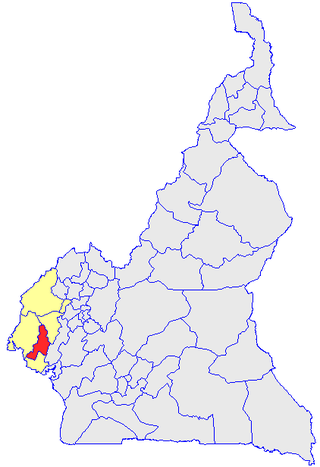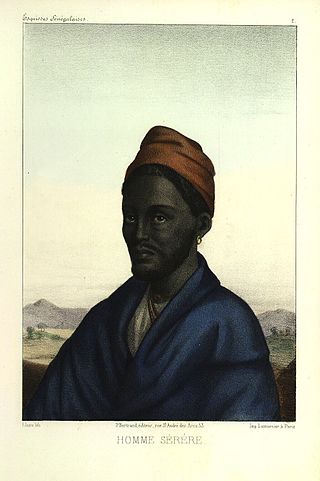Related Research Articles
The Kingdom of Baol or Bawol in central Senegal was one of the kingdoms that arose from the split-up of the Empire of Jolof (Diolof) in 1555. The ruler reigned from a capital in Diourbel.

Kumba Ialá Embaló, also spelled Yalá, was a Bissau-Guinean politician who was president from 17 February 2000 until he was deposed in a bloodless military coup on 14 September 2003. He belonged to the Balanta ethnic group and was President of the Social Renewal Party (PRS). In 2008 he converted to Islam and took the name Mohamed Ialá Embaló. He was the founder of the Party for Social Renewal. In 2014, Ialá died from a cardiopulmonary arrest.

Thabazimbi is an iron mining town in the Limpopo province of South Africa. The town is at the feet of the Ysterberg and is surrounded by the Witfonteinrand and Boshofberg with the majestic Kransberg in the background. The name Thabazimbi means mountain of iron because of the large iron ore reef that was discovered in 1919 by J. H. Williams. The mine boasts one of the largest mining shafts in Africa. More than 2 million tons of ore are mined every year and hauled by train to Mittal's iron and steel works. The railway line from Rustenburg reached the area in the 1930s and full scale iron and steel production began. The town was proclaimed in 1953. Kumba Iron Ore, previously Kumba Resources, is now the principal operator of the iron ore mine.

Kumba is a metropolitan city in the Meme department, Southwest Region, Western Cameroon, referred as "K-town" in local slang. Kumba is the most developed and largest city in the Meme Department and has attracted people from the local villages like Mbonge, Ekondo Titi, etc. Kumba has an estimated population of about 400,000 with three quarters of this population being youth. As a result of improvement in infant health care, rural-urban migration and infant mortality is falling while birthrates rise, causing the population of Kumba to increase. The N8 and N16 highways meet at Kumba.

Kumba is a steel roller coaster located at Busch Gardens Tampa Bay in Tampa, Florida. Manufactured by Bolliger & Mabillard, the ride opened in 1993. It stands 143 feet (44 m) tall and has a top speed of 60 miles per hour (97 km/h). Kumba features a total of seven inversions across the 3-minute ride.

Exxaro Resources Limited is a South Africa-based diversified resources company with a robust coal business and acquisitive growth prospects in minerals and energy solutions.
Nunu Kumba is one of 180 woredas in the Oromia Region of Ethiopia. Part of the East Welega Zone, Nunu Kumba is bordered on the southwest by the Didessa River which separates it from the Illubabor Zone, on the northwest by Jimma Arjo, on the north by Guto Wayu, on the northeast by Wama Bonaya, and on the southeast by the Wama which separates it from the Jimma Zone. The administrative center of this woreda is Nunu.

Meme is a department of Southwest Region in Cameroon. The department covers an area of 3,105 km2 and as of 2005 had a total population of 326,734. The capital of the department lies at Kumba. Within the self-declared Federal Republic of Ambazonia, Meme is a county making up the Equatorial State.
Kumba Iron Ore is an iron-ore mining company in South Africa. It is the fourth largest iron-ore producer in the world and the largest in Africa.
Bankon is a Bantu language spoken in the Moungo department of the Littoral Province of southwestern Cameroon. It has a lexical similarity of 86% with Rombi which is spoken in the nearby Meme department of Southwest Province.
Hon. Jemma Nunu Kumba is a South Sudanese politician. She is the current Minister of Gender, Child and Social Warfare of South Sudan. She founded the Sudan women Parliamentary Caucus in 2004 at the start of the comprehensive peace agreement. She was chosen by the SPLM as the speaker of the Revitalised Transitional National Legislative Assembly (R-TNLA). She became the first woman to preside over the parliament of South Sudan.
Maad a Signig Kumba Ndoffene Famak Joof was the King of Sine in modern-day Senegal. Maad a Sinig means king of Sine. He ruled from 1853 until his death on 23 August 1871. He was the son of Maad Souka Ndela Joof and Lingeer Gnilane Jogoy Joof. His father – Maad Souka Ndela came from The Royal House of Semou Njekeh Joof founded by Maad Semou Njekeh Joof in the early 18th century, which was the third and last Royal House of Joof family of Sine and Saloum. His paternal family ruled three Kingdoms : Sine, Kingdom of Saloum and previously the Kingdom of Baol. They descended from Maad Ndaah Njemeh Joof the 13th century King of Lâ (Laah) in Baol.

The Battle of Fandane-Thiouthioune, also known as the Battle of Somb or the Battle of Somb-Tioutioune, occurred on 18 July 1867. It was a religious war between the Serer people and the Muslim Marabouts in 19th-century Senegal and the Gambia, but it also had a political and economic dimension to it: vendetta and empire-building. Fandane, Thiouthioune and Somb were part of the pre-colonial Serer Kingdom of Sine, now part of independent Senegal.
Dingleton is a town in Northern Cape, South Africa.

Maad a Sinig means king of Sine. The ancient Kingdom of Sine, now part of Senegal, was a pre-colonial Serer kingdom. Their kings were titled Maad or Maad. The royal title Maad is sometimes used interchangeably with their ancient kings and landowners - the Lamanes. Between 1350 and 1969, more than fifty Serer kings have been crowned Maad a Sinig.

Maad a Sinig Ama Joof Gnilane Faye Joof was a king of Sine now part of present-day Senegal. He reigned from c. 1825 to 1853. He was fluent in several languages. He came from The Royal House of Semou Njekeh Joof. Maad a Sinig means king of Sine in the Serer-Sine language. The term Bur Sine is also used interchangeably with the proper title Maad a Sinig or Mad a Sinig. They both mean king Sine. Bour Sine is usually used by the Wolof people when referring to the Serer kings of Sine. The Serer people generally used the term Maad a Sinig or Mad a Sinig when referring to their kings.

Maad a Sinig Kumba Ndoffene Fa Ndeb Joof, also known as Kumba Ndoffene Joof II or Bour Sine Coumba Ndoffène Fandepp Diouf, was a King of Sine. Maad a Sinig translates as "King of Sine", Maad meaning king in the Serer language. The surname Joof is the English spelling in the Gambia. Diouf is the French spelling in Senegal.

The Battle of Logandème was an uprising led by the Serer King Maad a Sinig Kumba Ndoffene Famak Joof, king of Sine, against the French Empire. The battle took place at Logandème which was a part of Sine at the time. The battle was also a revenge attack against the Serer people after their resounding victory against France at the Battle of Djilass on 13 May 1859. It was the first time that France decided to employ cannonball in the Senegambia.

"Kumba Yo!" is a 2001 collaborative single by Guano Apes featuring German comedian Michael Mittermeier. This song is notable for being the only Apes song to use profanity, with only one use of the word "fucking" in the song and serves as their highest-charting single in their native Germany. The song uses elements of the song "Kumbaya". The video shows the band capturing and tying Mittermeier to their car.
The Kumba school massacre took place at Mother Francisca International Bilingual Academy during the Anglophone Crisis, in Kumba, Cameroon, in October 2020.
References
- ↑ Kumba at Ethnologue (18th ed., 2015) (subscription required)